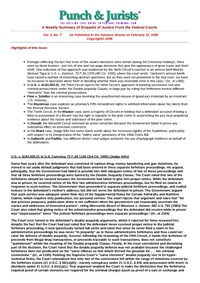Under 21 U.S.C. § 881(a)(6), all money furnished or intended to be furnished in exchange for illegal drugs, all drug proceeds, and all money used or intended to be used to facilitate illegal drug trafficking is subject to civil forfeiture. In this case, a majority of judges upheld the …
Court held that there was no "active employment" of gun as required to sustain a conviction where gun was found in a different location and there was no evidence that defendant displayed or brandished gun during drug crime.
The defendant in this case received a two point acceptance of responsibility reduction in his sentence under U.S.S.G. § 3E1.1(a); but was denied the "safety-valve" reduction on the grounds that he had "minimized his role" in the charged drug conspiracy. On appeal, he argued that "if one is sufficiently …
In this case the defendant was convicted of insurance fraud on the grounds that he had misrepresented the amount of capital available to cover losses for a new insurance company. When Hurricane Hugo hit, he was charged not with the $700,000 of capital that he misrepresented, but with some …
Case held that destruction of victim's private residence by fire did not have a sufficiently substantial effect on interstate commerce to support a conviction under the Federal arson statute.
Court vacated an enhancement based on managerial role where district court made no findings and failed to find that there were five or more participants or that crime was otherwise extensive.
In this case, the defendant argued that his criminal history category of II significantly over-represented the seriousness of his criminal history. Judge Ellis agreed that the argument was persuasive because, but for a nine and a half year old DUI conviction, the defendant's criminal history category would have been …
Case held that disparate impact of penalties for crack cocaine on Afro-Americans did not justify downward departure or application of rule of lenity since race is not relevant to determination of sentence.
In this case, three defendants pled guilty pursuant to cooperation agreements with the Government. At sentencing, the Government recommended sentences of 66, 84 and 60 months, reflecting the defendants' relative culpability and degree of cooperation. The district court rejected those recommendations and, starting at the bottom of the applicable …
In this case, three defendants pled guilty pursuant to cooperation agreements with the Government. At sentencing, the Government recommended sentences of 66, 84 and 60 months, reflecting the defendants' relative culpability and degree of cooperation. The district court rejected those recommendations and, starting at the bottom of the applicable …
In this case the defendant was arrested at the Miami airport, after a substantial amount of heroin was
discovered in her luggage. At the time, she was accompanied by her two daughters, aged 11 and 12.
She originally denied that she had any knowledge of the heroin. However, she …
In this wilful tax evasion case, the sole issue was whether the defendant knew that his income tax
returns omitted taxable income which should have been reported. At defense counsel's request, the
defendant submitted to a polygraph test to determine his knowledge and intent; and the defendant
moved to …
Court vacated upward departure based on psychological injury to victims and based on unsupported judicial conclusion that defendant's acts constributed to destruction of reputation of insurance companies.
Case affirmed a warrantless search of defendant's residence as justified by exigent circumstances, notwithstanding fact that officers were mistaken in belief that residence was the source of a security alarm that gave rise to search.
In discussing what constitutes "exigent circumstances", the Court wrote: "Exigent circumstances exist where …
One issue discussed in this case is the distinction between convictions that are "set aside" and those that are "expunged" for purposes of § 4A1.2. The precise issue was whether an earlier Federal Youth Correction Act conviction that was set aside should be counted in the defendant's criminal history …
Case vacated a sentence based on crack cocaine where evidence was insufficient to support conclusion that crack was reasonably forseeable and within scope of criminal activity of conspiracy.
The two defendants in this case arranged for the sale of some 24 kilograms of powder cocaine to a crack …
The defendant objected to the imposition of a $100,000 fine, arguing that he had no assets to pay the fine, that he had 33 (sic!) children, that he had been receiving disability payments from the Social Security Administration for several years, that he had not completed high school and …
Case held that violations of Rule 6(e)(2) provide for both civil and criminal contempt, but do not crate a private cause of action.
